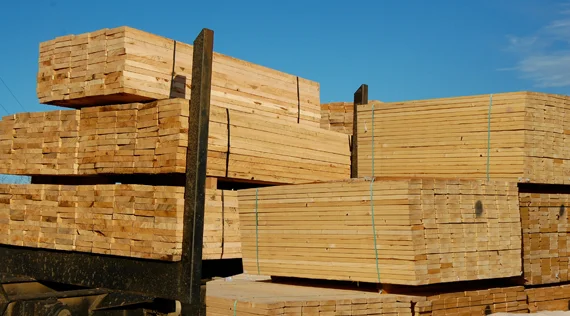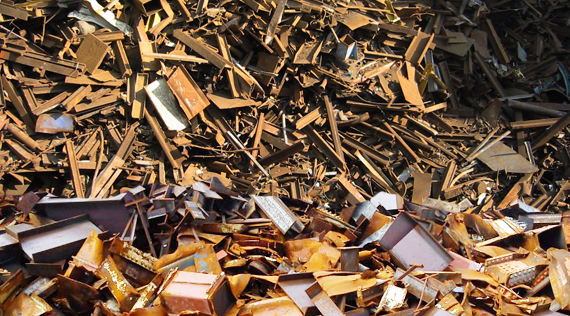Meanwhile, the owners of the two lumber companies say the uncertainty of the current trade war is a challenge.
SEATTLE (Scrap Monster): The logs, spruce, and fir, with bark removed and cut to length, flash by on the conveyor belt, 30 each minute, headed to the saw.
Along the way, a computer scans each log and determines how it should be cut to maximize the value of the finished products. Seconds later, the saws do their work.
Welcome to Pleasant River Lumber in Enfield, which may be the most modern spruce/fir sawmill in Maine.
“On this site alone, (we spent) $80 million since 2019,” said Chris Brochu, who owns the business with his brother Jason.
Maine’s lumber industry has survived the ups and downs of markets, weather, and politics for over a century. And for all those years, Maine’s lumber industry has been part of a complex relationship with Canada. Quebec and New Brunswick wrap around northern Maine, and in some cases, the border between countries has been largely irrelevant.
That relationship is evident in Madawaska, where Twin Rivers operates a paper mill paired with a pulp mill across the St. John River in Edmundston, New Brunswick. The two mills are connected by a pipeline that carries wood pulp from one country to another to be made into paper.
The Maine / Canada connection is also visible in other ways. The giant Irving Corporation of Canada owns large tracts of forest land in Maine and has three sawmills in the state.
Several Canadian companies operate sawmills in Quebec, situated directly alongside the U.S. border. Logs from the Maine woods are hauled across the border to be sawed into lumber, some of which is then sold back into the U.S.
For the Brochu’s at Pleasant River Lumber, that situation drives their hope for a U.S. tariff on Canadian lumber, to help them more easily compete for a share of the market. Pleasant River produces 2x4 and 2x6 “dimension lumber”, typically used to construct the frame for buildings. Those are the same products made at the border mills in Quebec, where Jason Brochu says Canadian government subsidies have allowed those lumber producers to sell at lower prices in the U.S.
“Over the last 30 to 40 years,” Jason Brochu said, “(Maine) used to produce a billion board feet a year of softwood lumber. Now it's 400 million feet, but we're cutting the same amount of wood. The rest of that is being exported, converted into lumber, and shipped back into the state and into the country."
To date, no U.S. tariff has been applied to Canadian lumber. However, there is a long-standing duty on Canadian softwood lumber, which is regulated by the U.S. Commerce Department to counter Canadian government subsidies for mills and logs harvested on government-owned land. That duty is currently 14%, and Brochu says it is scheduled to be increased later this year as part of a regular review process.
The tariff question is felt differently at Robbins Lumber in Searsmont, another family-owned sawmill business that produces white pine boards. Unlike Pleasant River, Robbins normally sells some of its products into Canada, which Alden Robbins says does not have as much pine available as Maine and northern New England.
“So we are kind of going against the flow,” Robbins explained. “I think most people assume Canada is shipping all the lumber into the U.S. and that’s true for the most part, especially for framing lumber. But when it comes to white pine we ship a fair amount into Ontario, Quebec and the Maritimes. “
However, since the Trump Administration threatened a 25% tariff on Canadian goods, Canada has imposed a reciprocal 25% tariff on U.S. products north of the border—including lumber. That means Robbins' pine boards have become more expensive for Canadians to purchase, which he says is having some impact.
“[A] couple people have held off, but some other customers are sticking with us,” he said. “We are not into the strong building season yet, so we have a bit of wait and see, see what happens.”
That is far from clear at the moment. The White House suspended new tariffs on many countries, but some remain on Canada. At this point, the Canadian tariffs on U.S. goods remain in place, and Canadian officials have said those tariffs will stay until the Trump administration drops its tariffs on Canada.
The forest products industry isn’t the only one with a complicated relationship with Canada. Maine’s lobster industry sells roughly 60 percent of its catch to Canadian processors, who often sell the meat back to American customers. Wild blueberries are also a cross-border industry. Some of Maine’s summer tourism is also tied closely to Canada.
Meanwhile, the owners of the two lumber companies say the uncertainty of the current trade war is a challenge.
“Ever since (Trump) announced that, it's been a struggle to sell production because buyers wonder what the price will be next week,” said Chris Brochu.
Robbins, who says most of their products are still sold in the U.S., was philosophical.
“Just like with eastern white pine, our resources take between 50 and 100 years to grow so we can’t make short-term decisions. Our plan is to be here for the long term.”
Courtesy: www.newscentermaine.com





 Member
Member